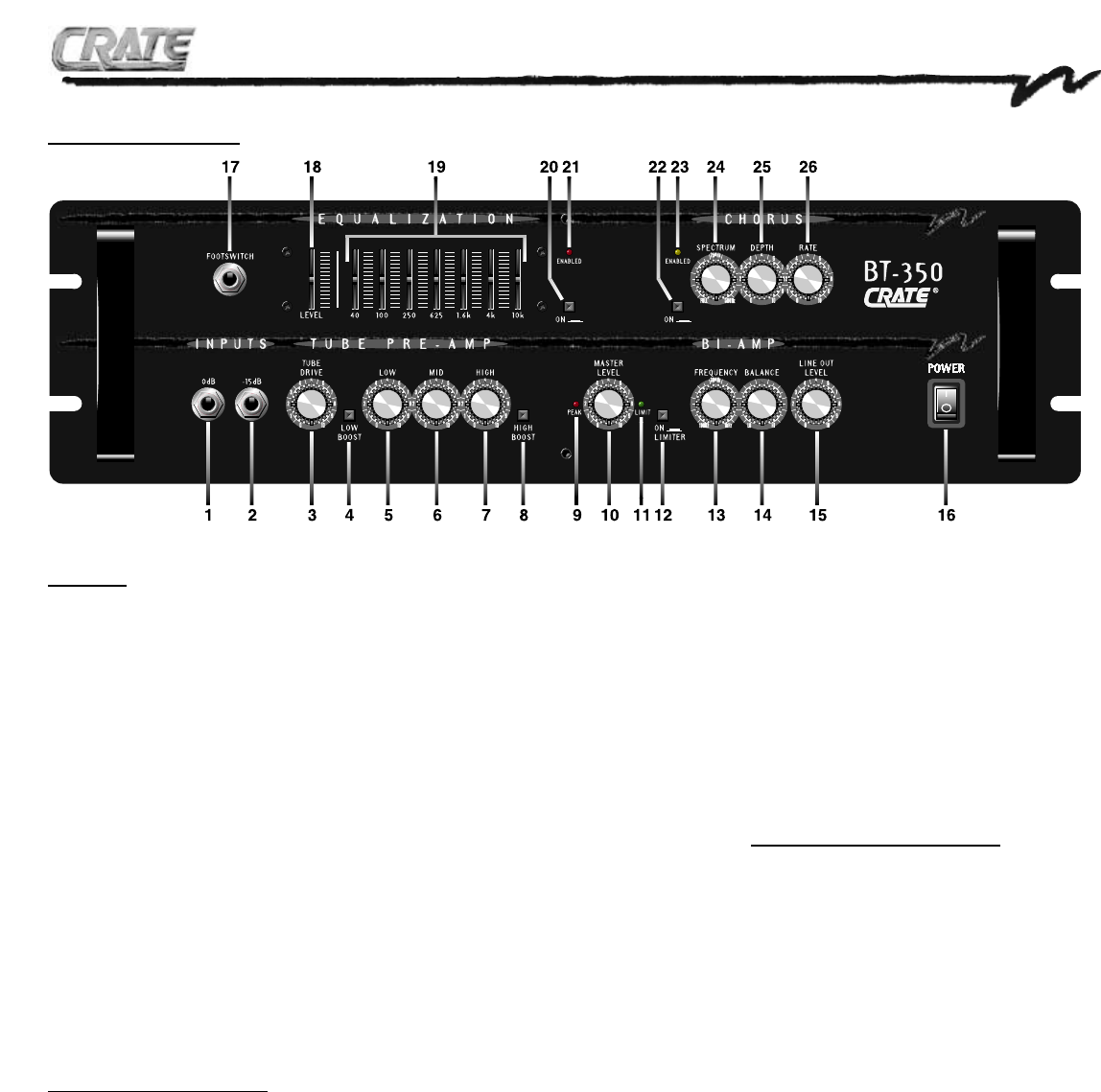INPUTS:
1. 0dB INPUT: Connect your bass
here using a shielded instrument cable.
The output signal of your bass will run
full-strength into the amplifier, which is
fine for most basses having passive elec-
tronics and/or low-output pickups. If
your bass has active on-board electron-
ics and/or active pickups, use the -15dB
input jack (#2) to avoid overloading the
amp’s input stage.
2. -15dB INPUT: Connect your bass
here if it has active on-board electronics
and/or active pickups. The bass’s output
signal will be attenuated by 15dB to keep
it from overloading the amplifier’s input
stage.
NOTE: Even if your bass has passive
electronics, if the Peak LED (#9) flashes
at seemingly low levels when you’re
plugged into the 0dB input, try using the
-15dB jack instead.
TUBE PRE-AMP section:
3. TUBE DRIVE: This serves as the gain
control for the BT-350’s tube preamp
section, which gives you the natural
compression of a tube amplifier. For the
best compression. adjust the Tube Drive
control as you strike your strings (hard).
Watch the Peak LED (#9): when the
LED starts to flash, you’ve reached a
choice setting for the best signal-to-noise
ratio and “tube feel.”
4. LOW BOOST: Switch on the Low
Boost and you’ll feel a large increase in
the very lowest bass notes, especially
noticeable when you hit the low B string
of a five or six-string bass. This is due to
the impressive 8dB of gain added at
20Hz, increasing the deep, “floor-shak-
ing” sounds of your instrument.
5. LOW: Adjust the output level of your
low-bass tones with this control: the cen-
ter position is “flat” (no boost or cut).
Turning the control to the left reduces the
low frequency output; turning to the
right increases the low frequency output.
The Low control primarily affects the
notes you feel, providing up to 13dB of
boost or cut at 40Hz.
6. MID: Adjust the output level of your
upper-bass tones with this control: the
center position is “flat” (no boost or cut).
Turning the control to the left reduces the
upper-bass output; turning to the right
increases the upper-bass output. The
Mid control provides up to 11dB of
boost or cut at 260Hz, which changes
the “voice” of your instrument’s sound.
By boosting the Mid control you can
make the sound of your bass cut through
the rest of the band, without getting a
whole lot louder.
7. HIGH: Adjust the amount of high-fre-
quency overtones with this control: the
center position is “flat” (no boost or cut).
Turning the control to the left reduces the
high-frequency output; turning to the
right increases the high-frequency out-
put. The High control allows up to 15dB
of boost or cut at 5kHz, which allows you
to adjust the “crispness” of the sound of
your bass. Players looking for a sharp,
slapping sound may tend to want this
control turned up farther than those who
seek a more traditional sound.
8. HIGH BOOST: Turning on the High
Boost greatly enhances the upper-har-
monic overtones of your bass, increasing
such subtleties as the sounds of your fin-
gers on the strings or the strings striking
the fretboard. High Boost produces an
additional 10dB of gain at 10kHz, mak-
ing the “crisp” characteristics of your
bass even more pronounced.
MASTER LEVEL SECTION:
9. PEAK LED: This LED indicator will
light when you’re nearing the highest
desirable level for your input signal and
are in danger of overdriving the pre-
amp’s solid state circuitry. (This can
cause the output of the amplifier to
sound distorted.) To get the maximum
benefit from the BT-350’s tube preamp
section (good, clean sound with the
“feel” of natural tube compression),
adjust the Tube Drive control (#3) until
this LED begins to flash when you’re hit-
ting your strings pretty hard.
10. MASTER LEVEL: This is the BT-350’s
master volume control. The output level
of the amplifier through your main
speakers, the Biamp Outputs and the
Effects Loop Send are simultaneously
adjusted by this control: at the full-left
position there will be no output; rotating
the control to the right increases the vol-
ume level.
The Front Panel:
44
BT-350
BT-350 ThunderBass Amplifier
